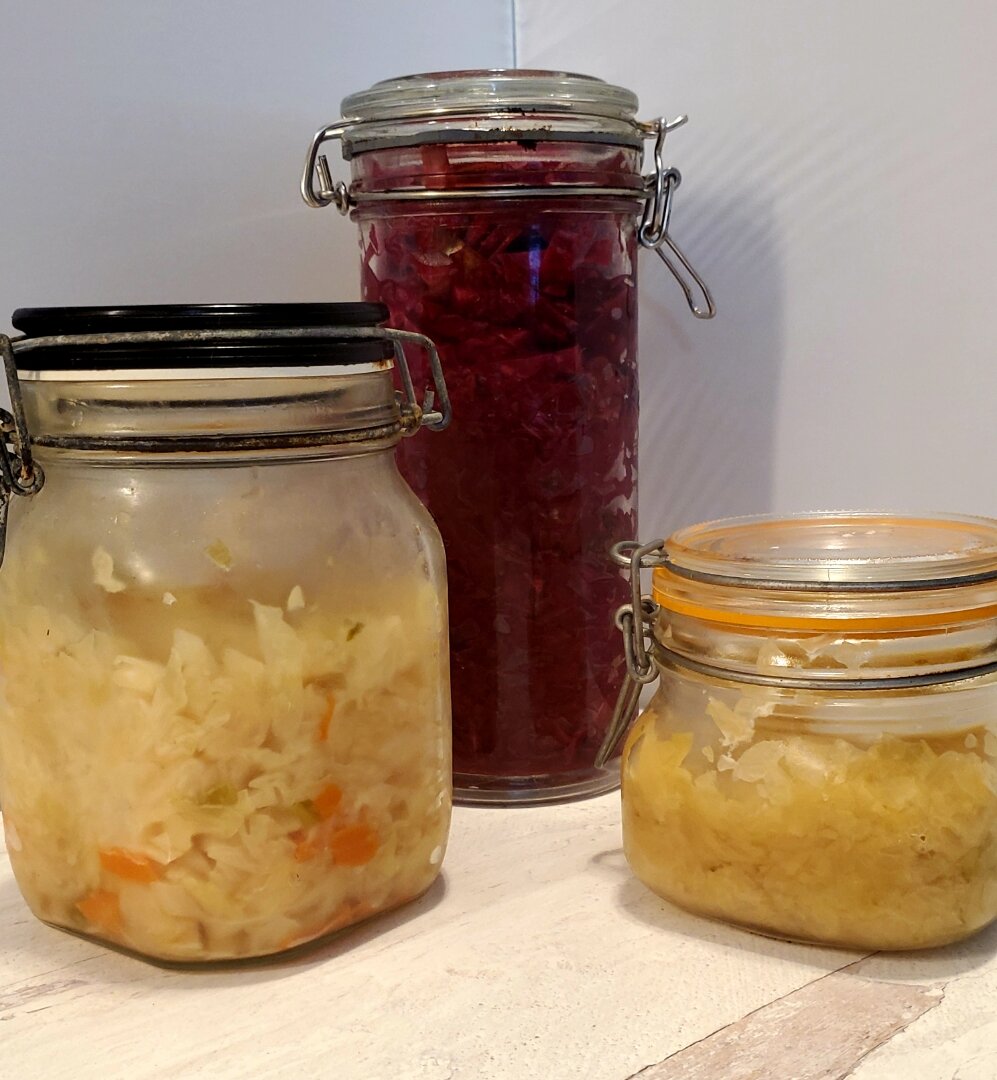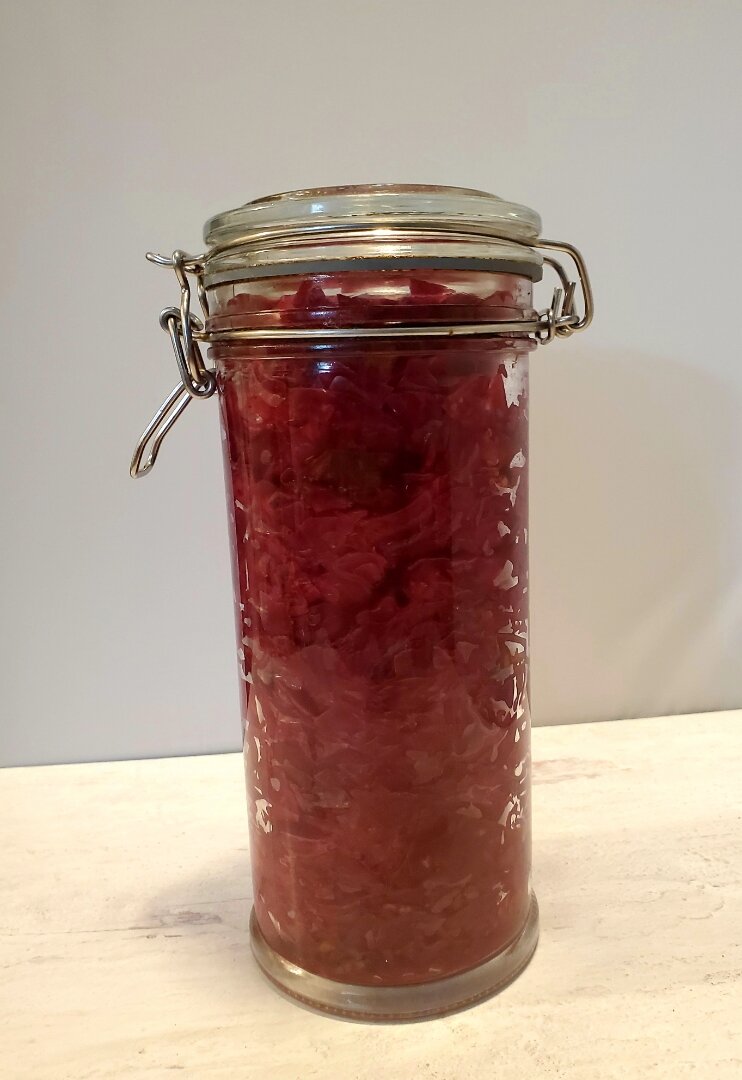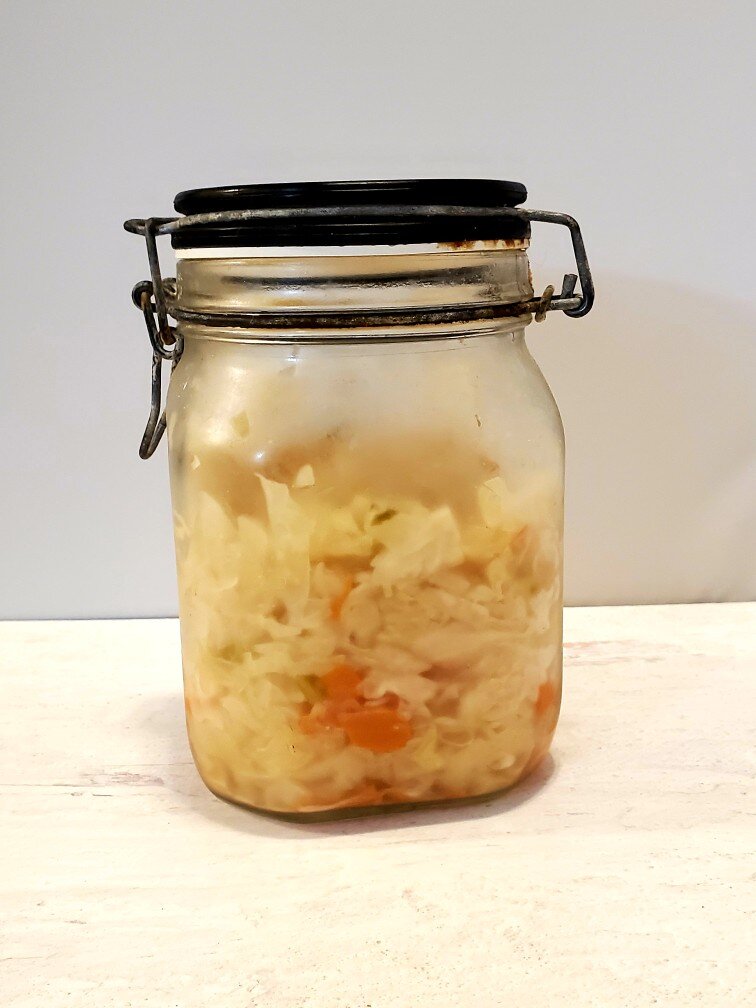A Selection of Kraut Recipes
Kraut! On Sunday, we talked about how to make various vegetable ferments. It’s quite easy! Today, I figured I should give y’all some recipes, so I decided to go with my favorite category of veg ferments: sauerkraut! Sauerkrauts are just cabbage ferments. Sometimes they’re plain, other times they have other stuff in them. Each of these recipes will a 1 litre fermenting jar, and none take a particularly long time to set up.
My kid likes her kraut young. 2 weeks is her ideal ferment time for cabbage she wants to eat without it being cooked first. I prefer a substantially less salty kraut, so I usually go 2-3 months. Recently, I pulled one that had been hanging out in the pantry for 6 months and I thought it also was lovely. Still retained crunch and everything! So you ferment yours until it tastes and feels like you want it to.
The three krauts we’ll do today are:
Purple plain
Slaw kraut
Ukha kraut
What’s an “ukha,” you say? It’s a Russian fish soup. We make it simillarly to this recipe, but tend to add lemon and of course cabbage. The child designed this when she was 3 or 4 to make soup-making easier for me; I’m pretty sure most of her motivation was so she could help cut stuff. I use it in a lot more recipes than just the ukha, but it keeps the name because that soup is what it was really designed for. The others are pretty self-explanatory: a regular plain kraut and a kraut that’s meant to be eaten in place of coleslaw. This is particularly good on tacos, by the way.
It’s pretty, right?
Purple Plain
Here’s what you need!
1 purple (or green! you do you) cabbage, around 3-5 pounds
3 tablespoons of uniodized salt (I eyeball this, but generally I use kosher salt)
Let’s put it together!
Shred or otherwise cut up the cabbage. I find this easiest if I first cut the cabbage in quarters, slice, then slice the slices. It takes about 5-7 minutes to do a whole cabbage.
Put it all in the bowl with the salt. You can layer or not, as you see fit. Let it sit 5-10 minutes, then either muddle or mash it all up for a few minutes with your hands.
Packing as you go (do not wait to pack tightly until the end or you will regret it!!!), mash all the salted cabbage into the fermenting jar. Really pack it all in there. If there’s still brine in your bowl when you’re done, pour in as much as you can. Close the jar, wipe it down, and write the date with a Sharpie on the lid. Ferment as long as you want to.
This is my favorite. You can see I forgot the caraway this time. Ah well.
Slaw kraut
Here’s what you need!
1 green cabbage, 3-5 pounds, shredded or cut as instructed above
1 carrot, shredded (you can use about a cup of those matchstick ones you can buy at the store if you want; it’s about a cup)
1/4 large yellow onion, sliced paper thin
1-2 tablespoons of caraway seeds
3 tablespoons salt
Let’s put it together!
This is same same as above. Mix it all together, mash with your hands after a brief rest, pack in jars, label, wait.
Occasionally we eat this raw, but this one is mostly for cooking.
Ukha kraut
Here’s what you need!
1 green cabbage, 3-5 pounds, shredded or cut per above
1 leek, cleaned and thinly sliced
3 tablespoons salt
Let’s put it together!
This is also the same instructions as above. See how easy making kraut is?
CORONAVIRUS NOTICES:
We are still at full production, and have gotten the most beautiful shipment of flour we ever could have laid eyes upon.
The sale for St. Pat’s is indefinite, because we want to make sure people are getting lower prices for these cultures. We know y’all didn’t expect to want as much as you do, and we’re not trying to break the already-strained bank for you can get them. It’s 20% off, so check the top of the website when you order for the promocode. We might change its title at some point, so just scroll up to find the coupon code.
Please make sure you start submitting questions about the pantry stuff you’ve got that you don’t know how to use to me, if you have them, in addition to the fermenting questions to the Ask Allie submission form. Your questions at feedback are and will continue to be critical for me to best know what information you don’t have that you need or want (or both), and particularly with the blog now refocused toward coronavirus kitchen support. Thank you for partnering with me in determining the arc of the blog content!
You can use any flour for any starter. If you want to make sure you can at some point have the original starter, save half of your packet in the freezer for after all the madness stops.





